
UHGEval
[ACL 2024] User-friendly evaluation framework: Eval Suite & Benchmarks: UHGEval, HaluEval, HalluQA, etc.
Stars: 178
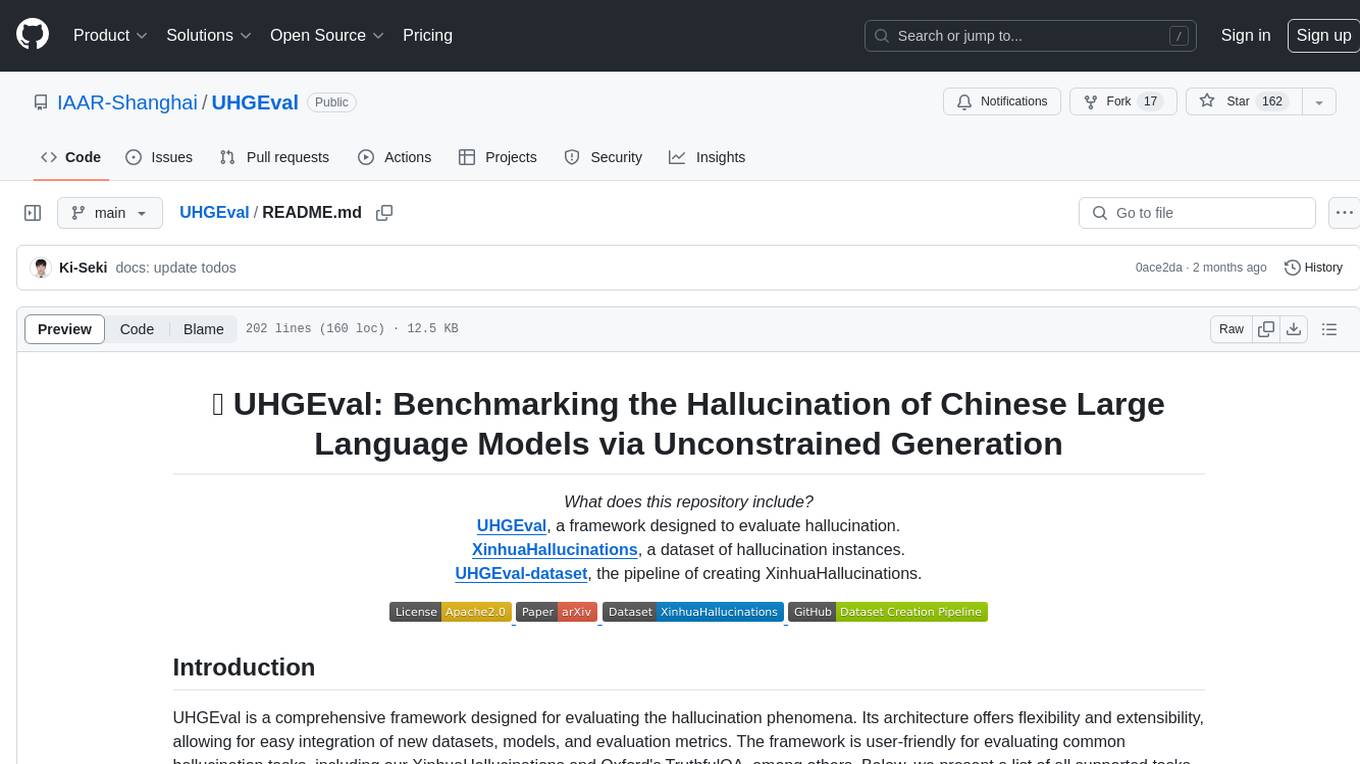
UHGEval is a comprehensive framework designed for evaluating the hallucination phenomena. It includes UHGEval, a framework for evaluating hallucination, XinhuaHallucinations dataset, and UHGEval-dataset pipeline for creating XinhuaHallucinations. The framework offers flexibility and extensibility for evaluating common hallucination tasks, supporting various models and datasets. Researchers can use the open-source pipeline to create customized datasets. Supported tasks include QA, dialogue, summarization, and multi-choice tasks.
README:
🍄 UHGEval: Benchmarking the Hallucination of Chinese Large Language Models via Unconstrained Generation
What does this repository include?
UHGEval: An unconstrained hallucination evaluation benchmark.
Eval Suite: A user-friendly evaluation framework for hallucination tasks.
Eval Suite supports other benchmarks, such as HalluQA and HaluEval.
# Install Eval Suite
conda create -n uhg python=3.10
conda activate uhg
pip install eval-suite
# Run evaluations with OpenAI Compatible API
eval_suite eval openai \
--model_name gpt-4o \
--api_key your_api_key \
--base_url https://api.openai.com/v1 \
--evaluators ExampleQAEvaluator UHGSelectiveEvaluator
# Or run evaluations with Hugging Face Transformers
eval_suite eval huggingface \
--model_name_or_path Qwen/Qwen2-0.5B-Instruct \
--apply_chat_template \
--evaluators ExampleQAEvaluator UHGSelectiveEvaluator
# After evaluation, you can gather statistics of the evaluation results
eval_suite stat
# List all available evaluators
eval_suite list
# Get help
eval_suite --help[!Tip]
- Refer to
demo.ipynbfor more detailed examples.- Run
export HF_ENDPOINT=https://hf-mirror.comto use the Chinese mirror if you cannot connect to Hugging Face.- SilliconFlow provides free API keys for many models, and you can apply for one at https://siliconflow.cn/pricing.
UHGEval is a large-scale benchmark designed for evaluating hallucination in professional Chinese content generation. It builds on unconstrained text generation and hallucination collection, incorporating both automatic annotation and manual review.
UHGEvalDataset. UHGEval contains two dataset versions. The full version includes 5,141 data items, while a concise version with 1,000 items has been created for more efficient evaluation. Below is an example in UHGEvalDataset.
Example
{
"id": "num_000432",
"headLine": "(社会)江苏首次评选消费者最喜爱的百种绿色食品",
"broadcastDate": "2015-02-11 19:46:49",
"type": "num",
"newsBeginning": " 新华社南京2月11日电(记者李响)“民以食为天,食以安为先”。江苏11日发布“首届消费者最喜爱的绿色食品”评选结果,老山蜂蜜等100种食品获得消费者“最喜爱的绿色食品”称号。",
"hallucinatedContinuation": "江苏是全国绿色食品生产最发达的省份之一。",
"generatedBy": "InternLM_20B_Chat",
"annotations": [
"江苏<sep>合理",
"全国<sep>合理",
"绿色食品生产<sep>合理",
"发达<sep>不合理,没有事实证明江苏是全国绿色食品生产发达的省份,但可以确定的是,江苏在绿色食品生产上有积极的实践和推动",
"省份<sep>合理",
"之一<sep>不合理,没有具体的事实证据表明江苏是全国绿色食品生产发达的省份之一"
],
"realContinuation": "61家获奖生产企业共同签署诚信公约,共建绿色食品诚信联盟。",
"newsRemainder": "61家获奖生产企业共同签署诚信公约,共建绿色食品诚信联盟。这是江苏保障食品安全、推动绿色食品生产的重要举措。\n 此次评选由江苏省绿色食品协会等部门主办,并得到江苏省农委、省委农工办、省工商局、省地税局、省信用办、省消协等单位大力支持。评选历时4个多月,经企业报名、组委会初筛、消费者投票等层层选拔,最终出炉的百强食品榜单由消费者亲自票选得出,网络、短信、报纸及现场投票共310多万份票数,充分说明了评选结果的含金量。\n 食品安全一直是社会关注的热点。此次评选过程中,组委会工作人员走街头、进超市,邀请媒体、消费者、专家深入产地开展绿色食品基地行,除了超市选购外,还搭建“诚信购微信商城”“中国移动MO生活绿色有机馆”等线上销售平台,开创江苏绿色食品“评展销”结合新局面。评选不仅宣传了江苏绿色品牌食品,更推动了省内绿色食品市场诚信体系的建立,为江苏绿色食品走向全国搭建了权威的平台。\n 江苏省农委副主任李俊超表示,绿色食品消费是当前社会重要的消费趋势。本次评选不仅为社会培育了食品安全诚信文化,也提高了消费者对食品质量和标识的甄别能力,实现了消费者和生产企业的“双赢”。\n 与会企业表示,能够入选“首届江苏消费者最喜爱的绿色食品”是消费者的信任和支持,他们将以此荣誉作为企业发展的新起点,严把食品质量关,推介放心安全的绿色品牌食品,促进产业稳定健康发展。(完)"
}Evaluation Methods. UHGEval offers a variety of evaluation methods, including discriminative evaluation, generative evaluation, and selective evaluation.
| Evaluator | Metric | Description |
|---|---|---|
UHGDiscKeywordEvaluator |
Average Accuracy | Given a keyword, the LLM determines whether it contains hallucination. |
UHGDiscSentenceEvaluator |
Average Accuracy | Given a sentence, the LLM determines whether it contains hallucination. |
UHGGenerativeEvaluator |
BLEU-4, ROUGE-L, kwPrec, BertScore | Given a continuation prompt, the LLM generates a continuation. |
UHGSelectiveEvaluator |
Accuracy | Given hallucinated text and unhallucinated text, the LLM selects the realistic text. |
To facilitate evaluation, we have developed a user-friendly evaluation framework called Eval Suite. Currently, Eval Suite supports common hallucination evaluation benchmarks, allowing for comprehensive evaluation of the same LLM with just one command as shown in the Quick Start section.
| Benchmark | Evaluator | More Information |
|---|---|---|
| C-Eval | CEvalEvaluator |
src/eval_suite/benchs/ceval |
| ExampleQA | ExampleQAEvaluator |
src/eval_suite/benchs/exampleqa |
| HalluQA | HalluQAMCEvaluator |
src/eval_suite/benchs/halluqa |
| HaluEval |
HaluEvalDialogEvaluatorHaluEvalQAEvaluatorHaluEvalSummaEvaluator
|
src/eval_suite/benchs/halueval |
| UHGEval |
UHGDiscKeywordEvaluatorUHGDiscSentenceEvaluatorUHGGenerativeEvaluatorUHGSelectiveEvaluator
|
src/eval_suite/benchs/uhgeval |
@inproceedings{liang-etal-2024-uhgeval,
title = "{UHGE}val: Benchmarking the Hallucination of {C}hinese Large Language Models via Unconstrained Generation",
author = "Liang, Xun and
Song, Shichao and
Niu, Simin and
Li, Zhiyu and
Xiong, Feiyu and
Tang, Bo and
Wang, Yezhaohui and
He, Dawei and
Peng, Cheng and
Wang, Zhonghao and
Deng, Haiying",
editor = "Ku, Lun-Wei and
Martins, Andre and
Srikumar, Vivek",
booktitle = "Proceedings of the 62nd Annual Meeting of the Association for Computational Linguistics (Volume 1: Long Papers)",
month = aug,
year = "2024",
address = "Bangkok, Thailand",
publisher = "Association for Computational Linguistics",
url = "https://aclanthology.org/2024.acl-long.288",
doi = "10.18653/v1/2024.acl-long.288",
pages = "5266--5293",
}Click me to show all TODOs
- [ ] feat: vLLM offline inference benchmarking
- [ ] feat(benchs): add TruthfulQA benchmark
For Tasks:
Click tags to check more tools for each tasksFor Jobs:
Alternative AI tools for UHGEval
Similar Open Source Tools

UHGEval
UHGEval is a comprehensive framework designed for evaluating the hallucination phenomena. It includes UHGEval, a framework for evaluating hallucination, XinhuaHallucinations dataset, and UHGEval-dataset pipeline for creating XinhuaHallucinations. The framework offers flexibility and extensibility for evaluating common hallucination tasks, supporting various models and datasets. Researchers can use the open-source pipeline to create customized datasets. Supported tasks include QA, dialogue, summarization, and multi-choice tasks.
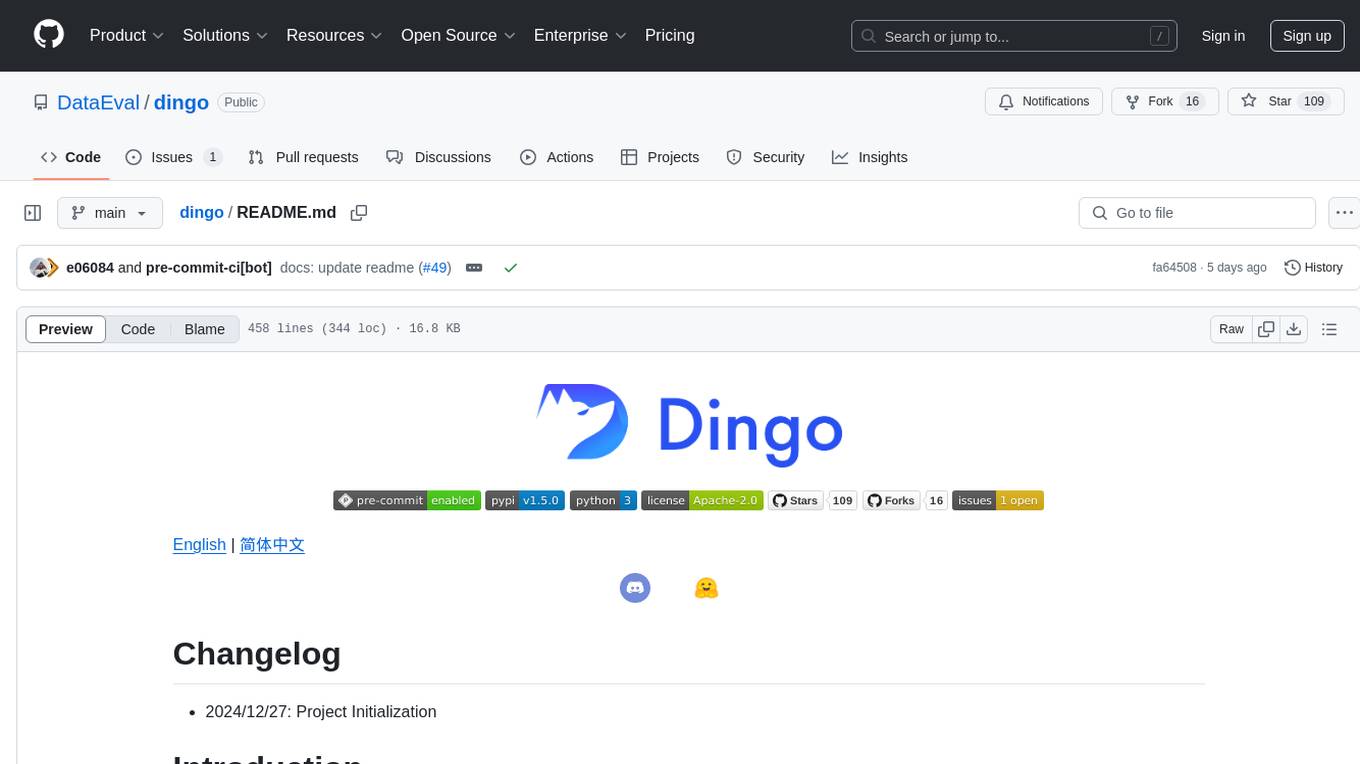
dingo
Dingo is a data quality evaluation tool that automatically detects data quality issues in datasets. It provides built-in rules and model evaluation methods, supports text and multimodal datasets, and offers local CLI and SDK usage. Dingo is designed for easy integration into evaluation platforms like OpenCompass.
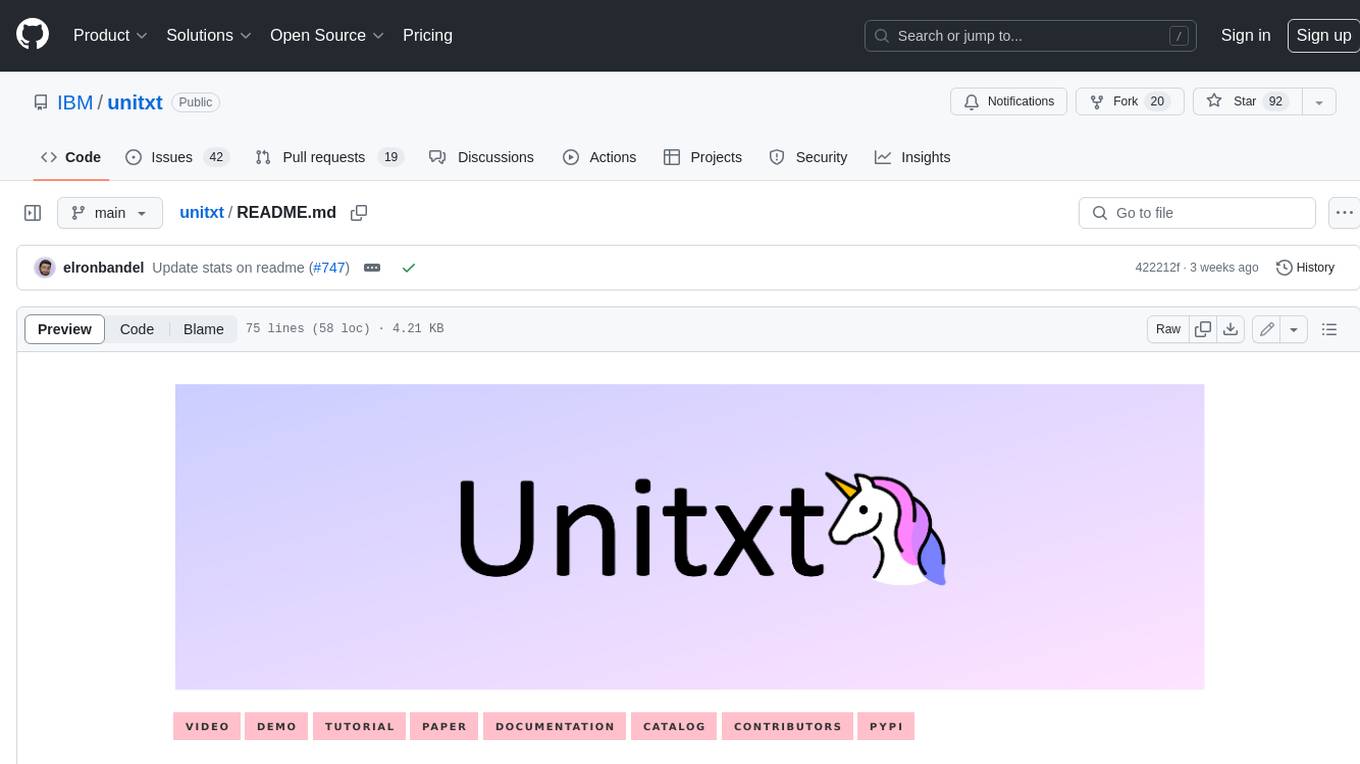
unitxt
Unitxt is a customizable library for textual data preparation and evaluation tailored to generative language models. It natively integrates with common libraries like HuggingFace and LM-eval-harness and deconstructs processing flows into modular components, enabling easy customization and sharing between practitioners. These components encompass model-specific formats, task prompts, and many other comprehensive dataset processing definitions. The Unitxt-Catalog centralizes these components, fostering collaboration and exploration in modern textual data workflows. Beyond being a tool, Unitxt is a community-driven platform, empowering users to build, share, and advance their pipelines collaboratively.
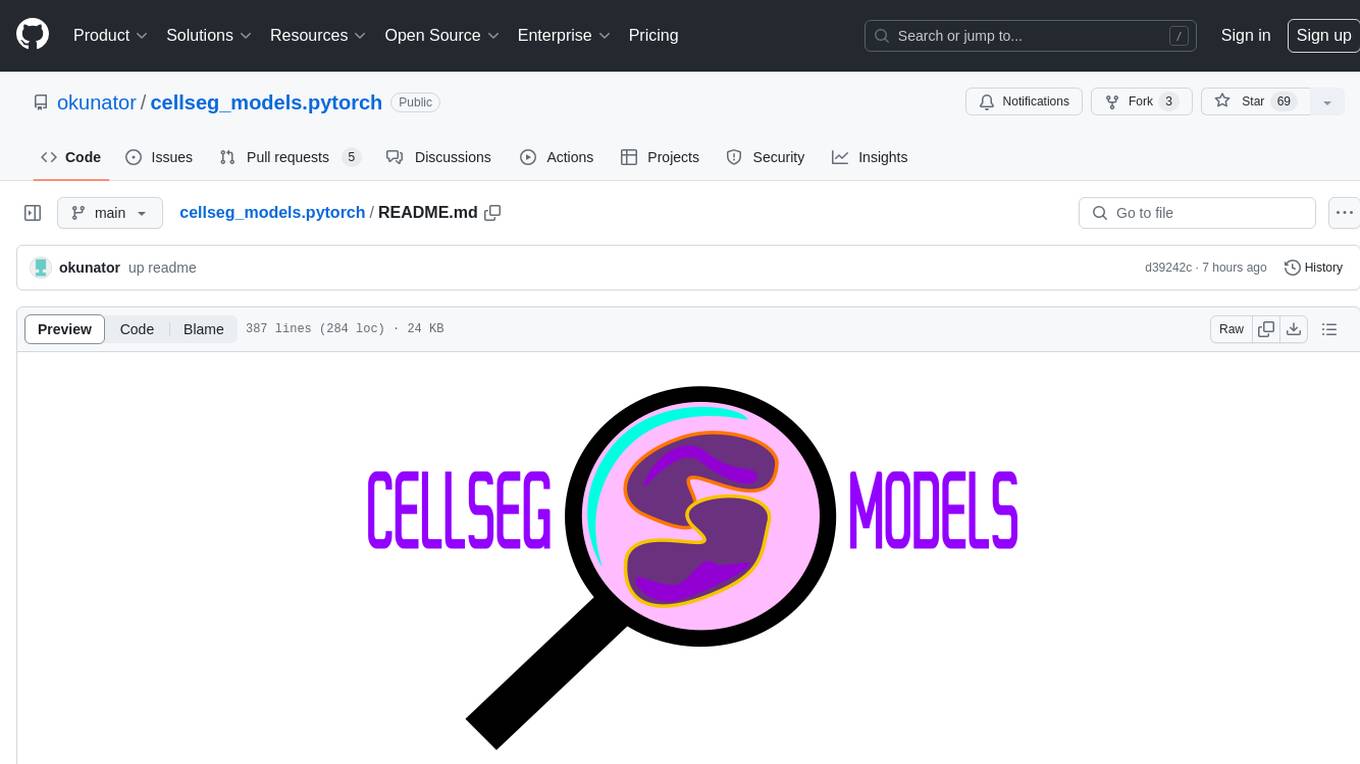
cellseg_models.pytorch
cellseg-models.pytorch is a Python library built upon PyTorch for 2D cell/nuclei instance segmentation models. It provides multi-task encoder-decoder architectures and post-processing methods for segmenting cell/nuclei instances. The library offers high-level API to define segmentation models, open-source datasets for training, flexibility to modify model components, sliding window inference, multi-GPU inference, benchmarking utilities, regularization techniques, and example notebooks for training and finetuning models with different backbones.
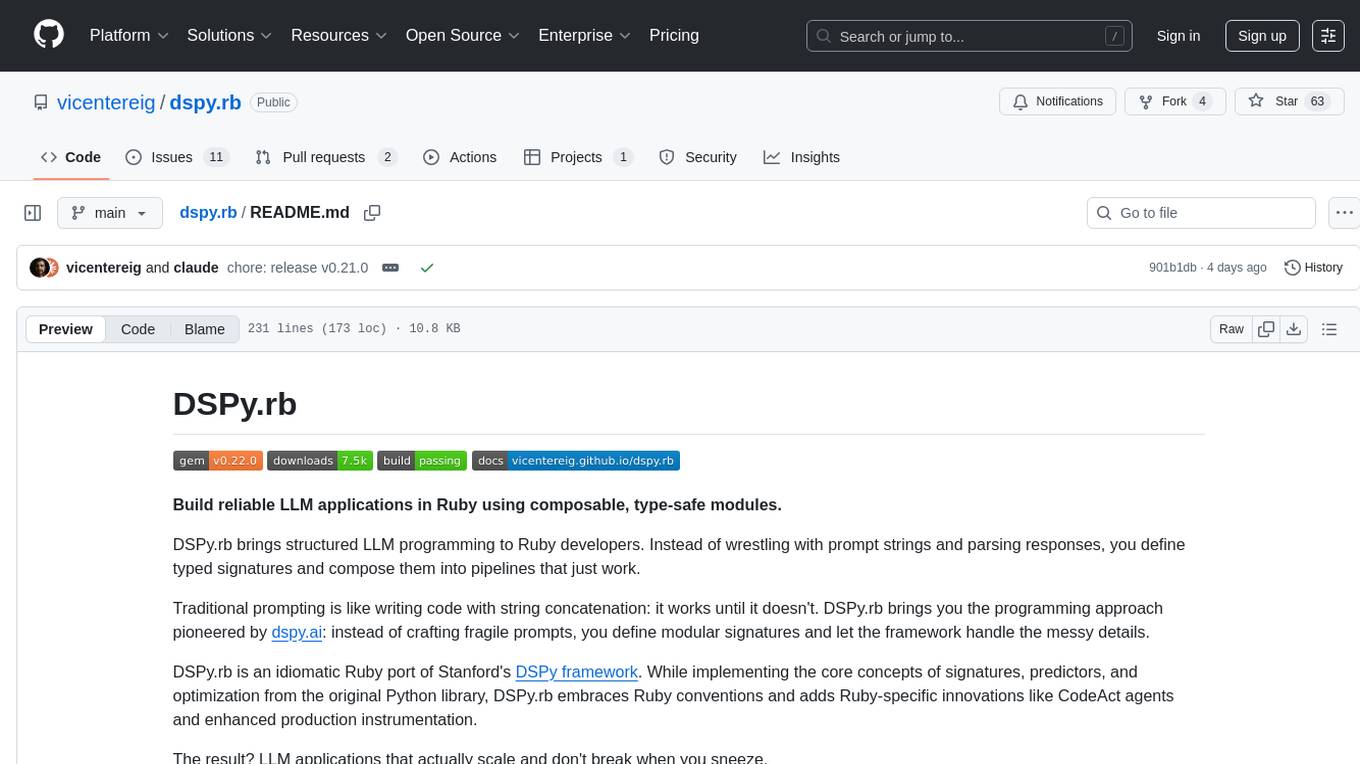
dspy.rb
DSPy.rb is a Ruby framework for building reliable LLM applications using composable, type-safe modules. It enables developers to define typed signatures and compose them into pipelines, offering a more structured approach compared to traditional prompting. The framework embraces Ruby conventions and adds innovations like CodeAct agents and enhanced production instrumentation, resulting in scalable LLM applications that are robust and efficient. DSPy.rb is actively developed, with a focus on stability and real-world feedback through the 0.x series before reaching a stable v1.0 API.
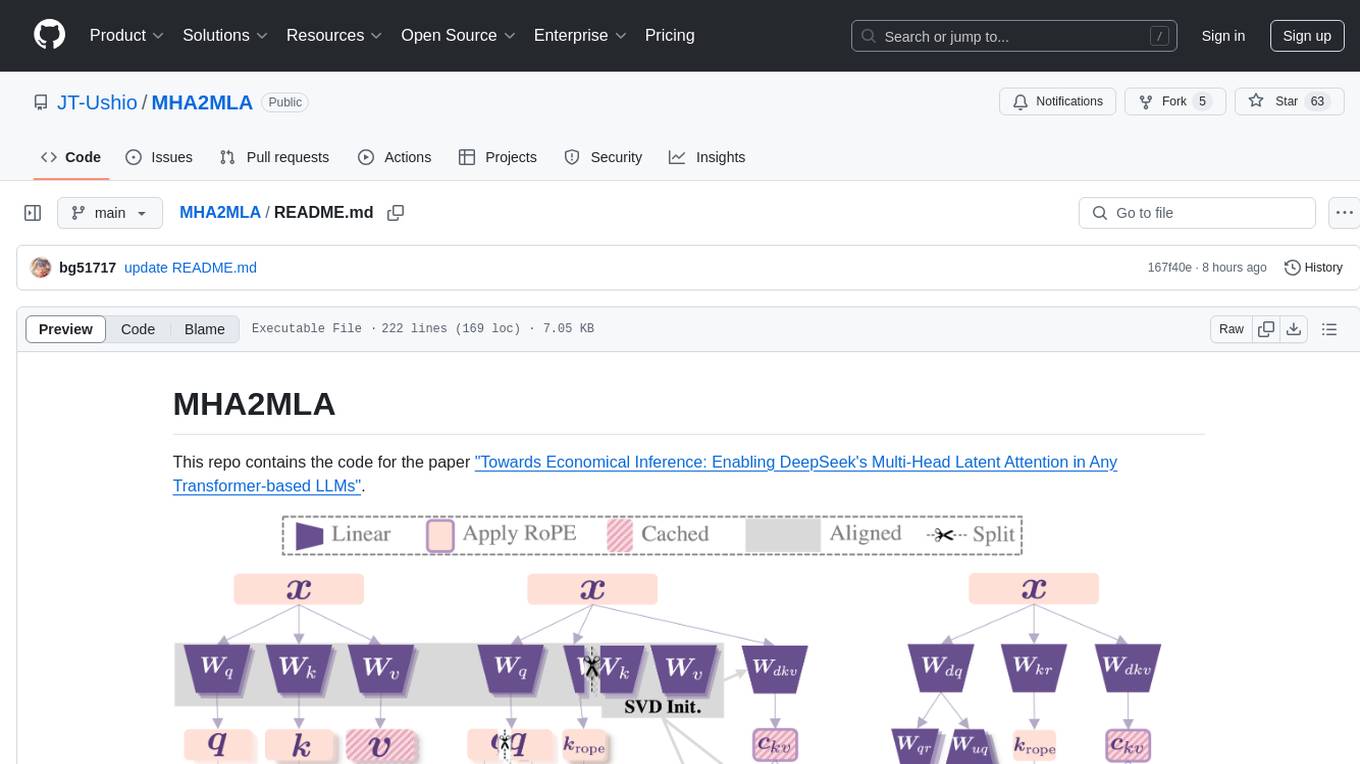
MHA2MLA
This repository contains the code for the paper 'Towards Economical Inference: Enabling DeepSeek's Multi-Head Latent Attention in Any Transformer-based LLMs'. It provides tools for fine-tuning and evaluating Llama models, converting models between different frameworks, processing datasets, and performing specific model training tasks like Partial-RoPE Fine-Tuning and Multiple-Head Latent Attention Fine-Tuning. The repository also includes commands for model evaluation using Lighteval and LongBench, along with necessary environment setup instructions.
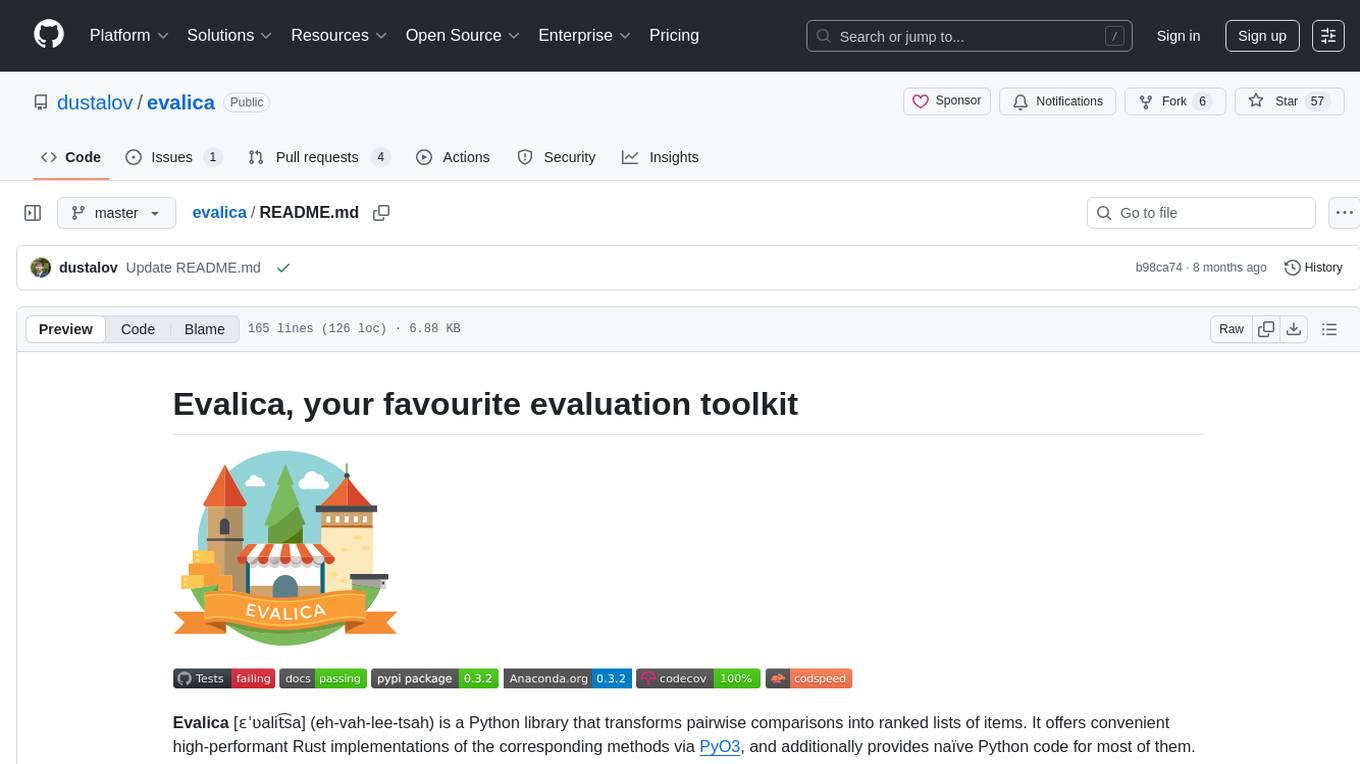
evalica
Evalica is a powerful tool for evaluating code quality and performance in software projects. It provides detailed insights and metrics to help developers identify areas for improvement and optimize their code. With support for multiple programming languages and frameworks, Evalica offers a comprehensive solution for code analysis and optimization. Whether you are a beginner looking to learn best practices or an experienced developer aiming to enhance your code quality, Evalica is the perfect tool for you.
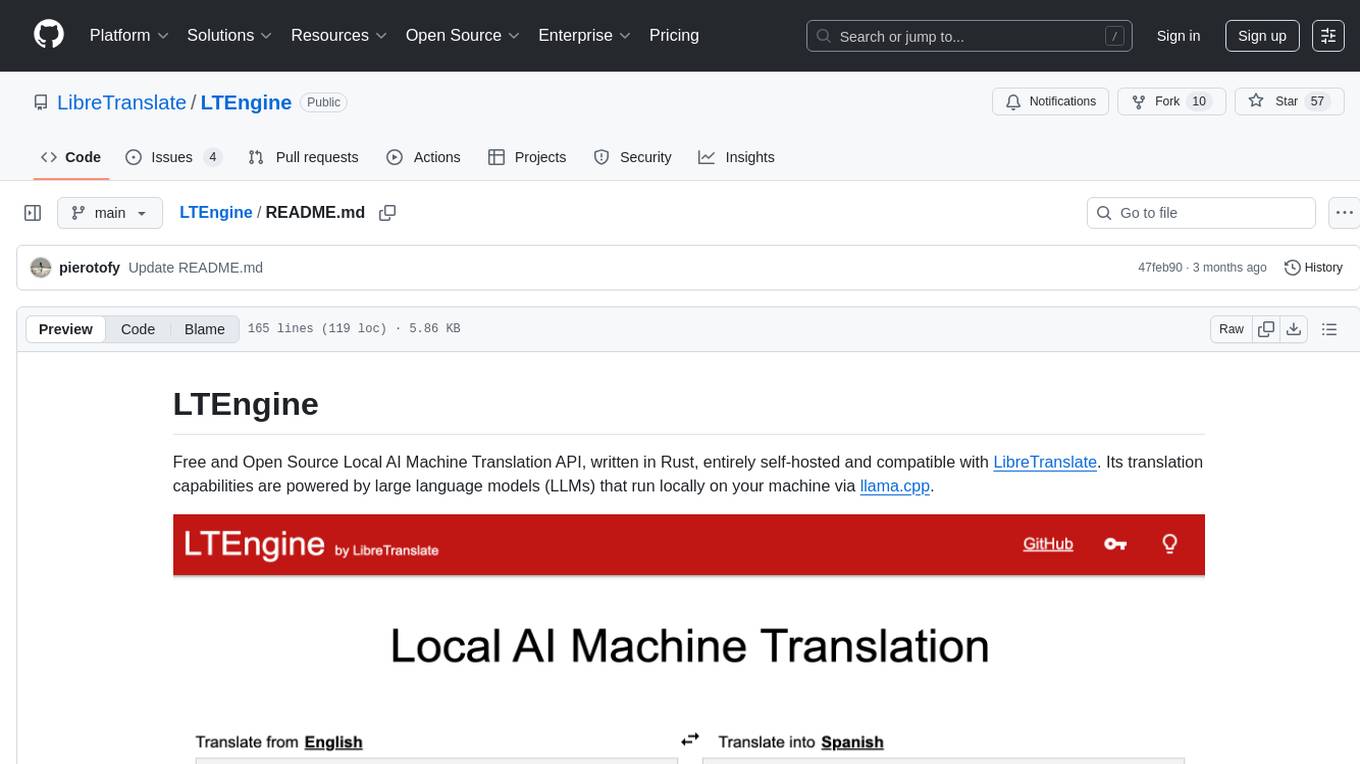
LTEngine
LTEngine is a free and open-source local AI machine translation API written in Rust. It is self-hosted and compatible with LibreTranslate. LTEngine utilizes large language models (LLMs) via llama.cpp, offering high-quality translations that rival or surpass DeepL for certain languages. It supports various accelerators like CUDA, Metal, and Vulkan, with the largest model 'gemma3-27b' fitting on a single consumer RTX 3090. LTEngine is actively developed, with a roadmap outlining future enhancements and features.
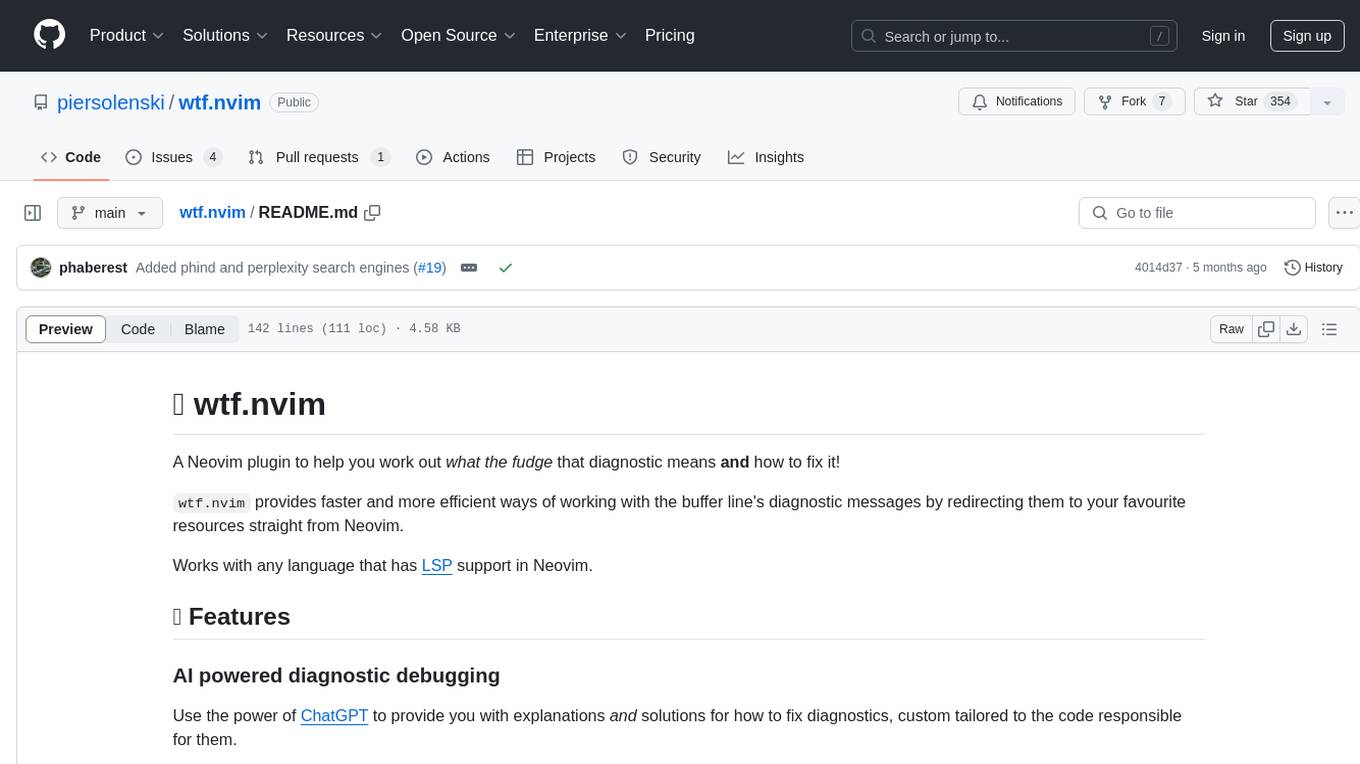
wtf.nvim
wtf.nvim is a Neovim plugin that enhances diagnostic debugging by providing explanations and solutions for code issues using ChatGPT. It allows users to search the web for answers directly from Neovim, making the debugging process faster and more efficient. The plugin works with any language that has LSP support in Neovim, offering AI-powered diagnostic assistance and seamless integration with various resources for resolving coding problems.
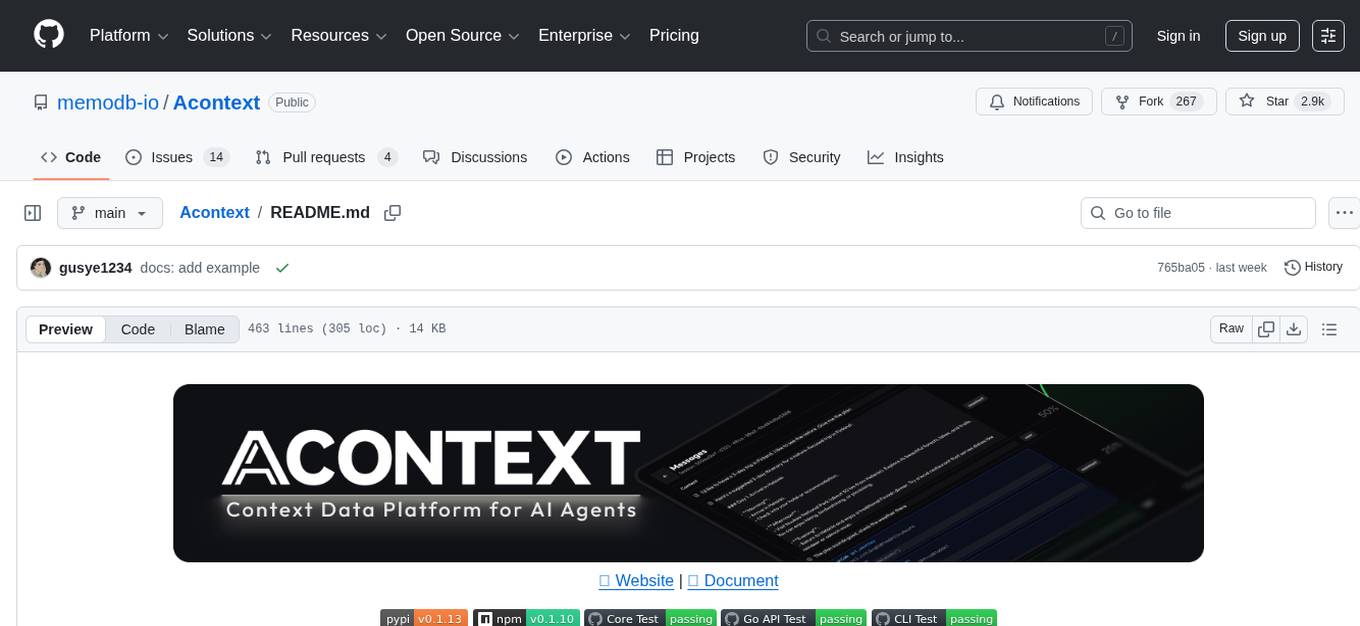
Acontext
Acontext is a context data platform designed for production AI agents, offering unified storage, built-in context management, and observability features. It helps agents scale from local demos to production without the need to rebuild context infrastructure. The platform provides solutions for challenges like scattered context data, long-running agents requiring context management, and tracking states from multi-modal agents. Acontext offers core features such as context storage, session management, disk storage, agent skills management, and sandbox for code execution and analysis. Users can connect to Acontext, install SDKs, initialize clients, store and retrieve messages, perform context engineering, and utilize agent storage tools. The platform also supports building agents using end-to-end scripts in Python and Typescript, with various templates available. Acontext's architecture includes client layer, backend with API and core components, infrastructure with PostgreSQL, S3, Redis, and RabbitMQ, and a web dashboard. Join the Acontext community on Discord and follow updates on GitHub.
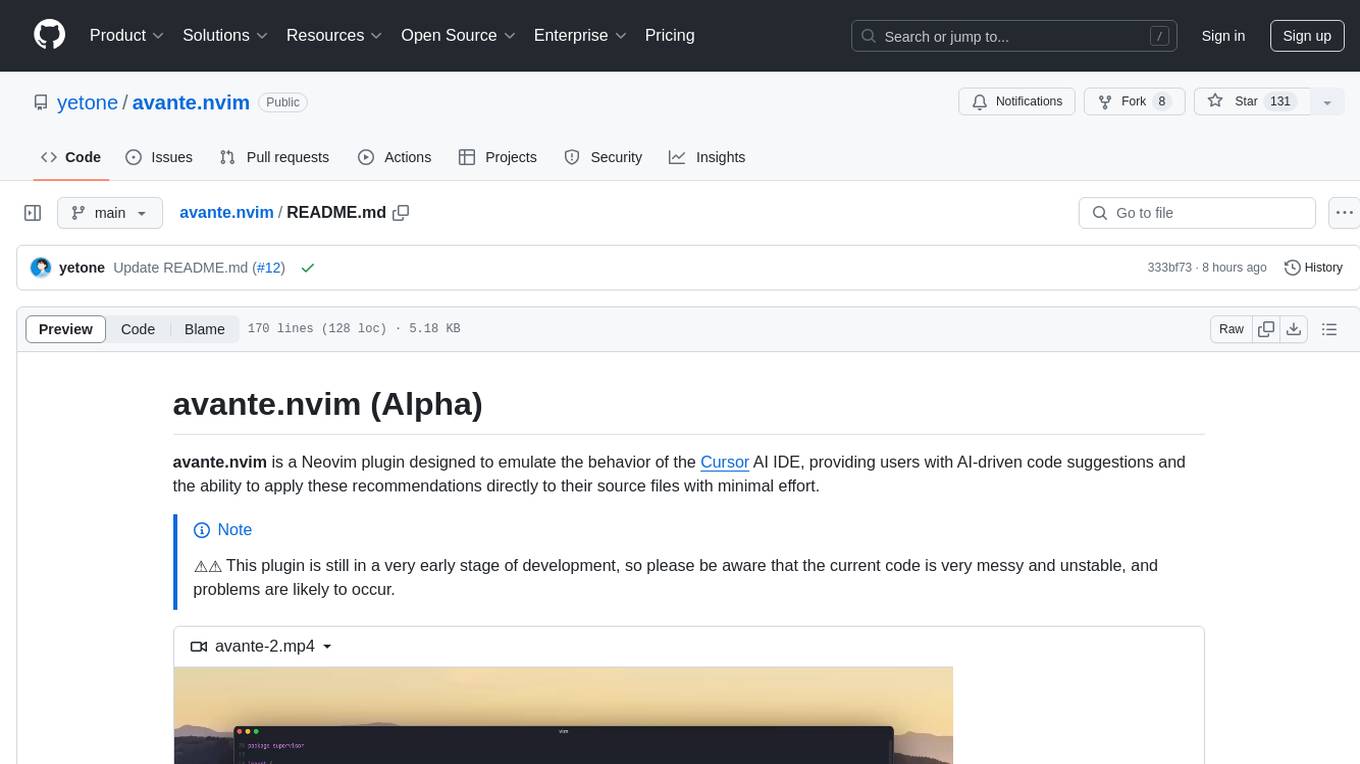
avante.nvim
avante.nvim is a Neovim plugin that emulates the behavior of the Cursor AI IDE, providing AI-driven code suggestions and enabling users to apply recommendations to their source files effortlessly. It offers AI-powered code assistance and one-click application of suggested changes, streamlining the editing process and saving time. The plugin is still in early development, with functionalities like setting API keys, querying AI about code, reviewing suggestions, and applying changes. Key bindings are available for various actions, and the roadmap includes enhancing AI interactions, stability improvements, and introducing new features for coding tasks.
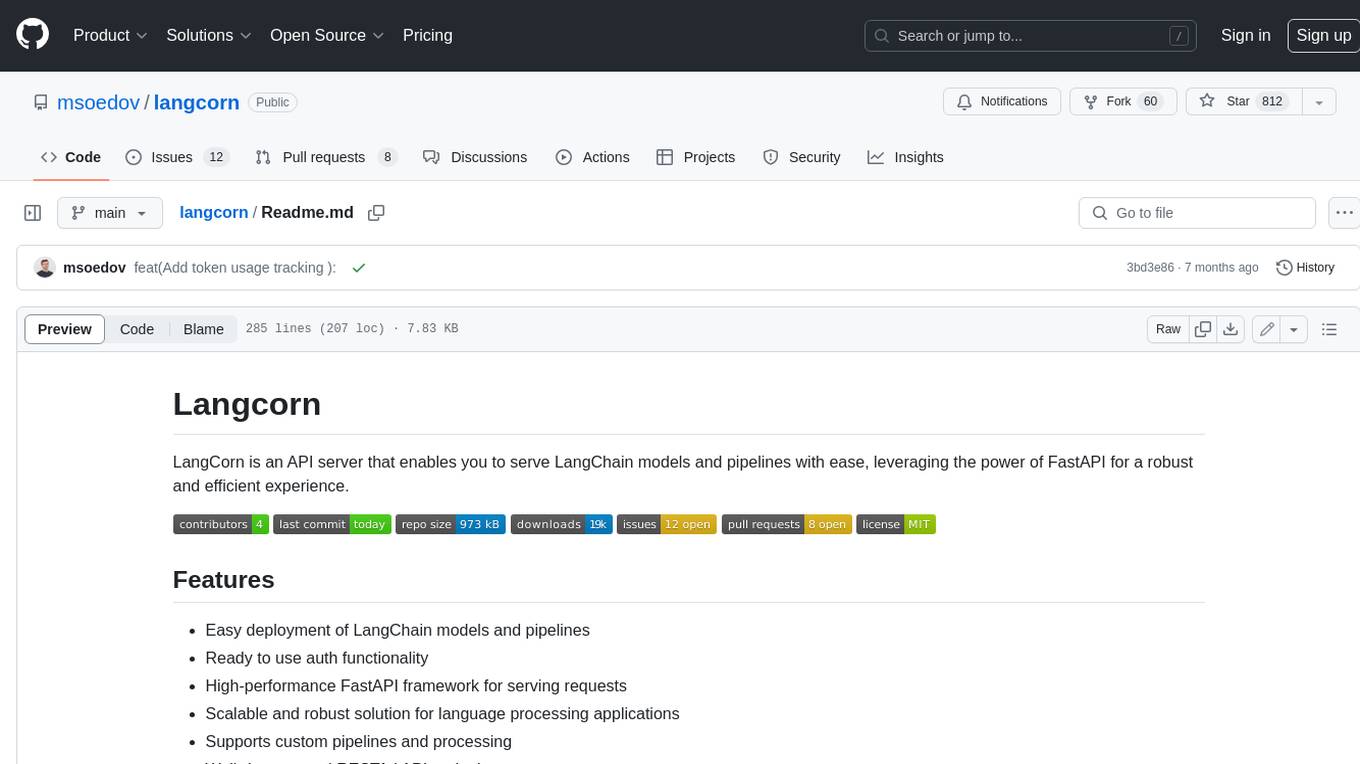
langcorn
LangCorn is an API server that enables you to serve LangChain models and pipelines with ease, leveraging the power of FastAPI for a robust and efficient experience. It offers features such as easy deployment of LangChain models and pipelines, ready-to-use authentication functionality, high-performance FastAPI framework for serving requests, scalability and robustness for language processing applications, support for custom pipelines and processing, well-documented RESTful API endpoints, and asynchronous processing for faster response times.
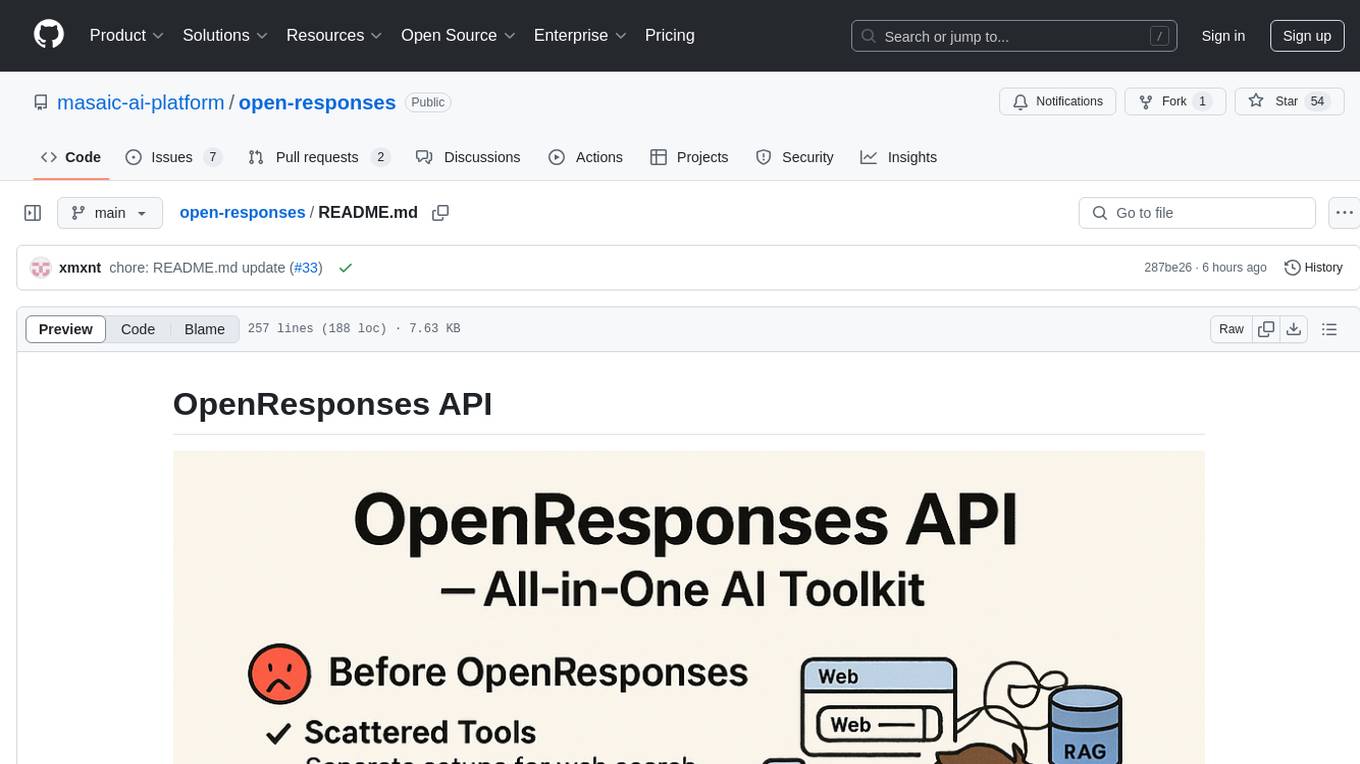
open-responses
OpenResponses API provides enterprise-grade AI capabilities through a powerful API, simplifying development and deployment while ensuring complete data control. It offers automated tracing, integrated RAG for contextual information retrieval, pre-built tool integrations, self-hosted architecture, and an OpenAI-compatible interface. The toolkit addresses development challenges like feature gaps and integration complexity, as well as operational concerns such as data privacy and operational control. Engineering teams can benefit from improved productivity, production readiness, compliance confidence, and simplified architecture by choosing OpenResponses.
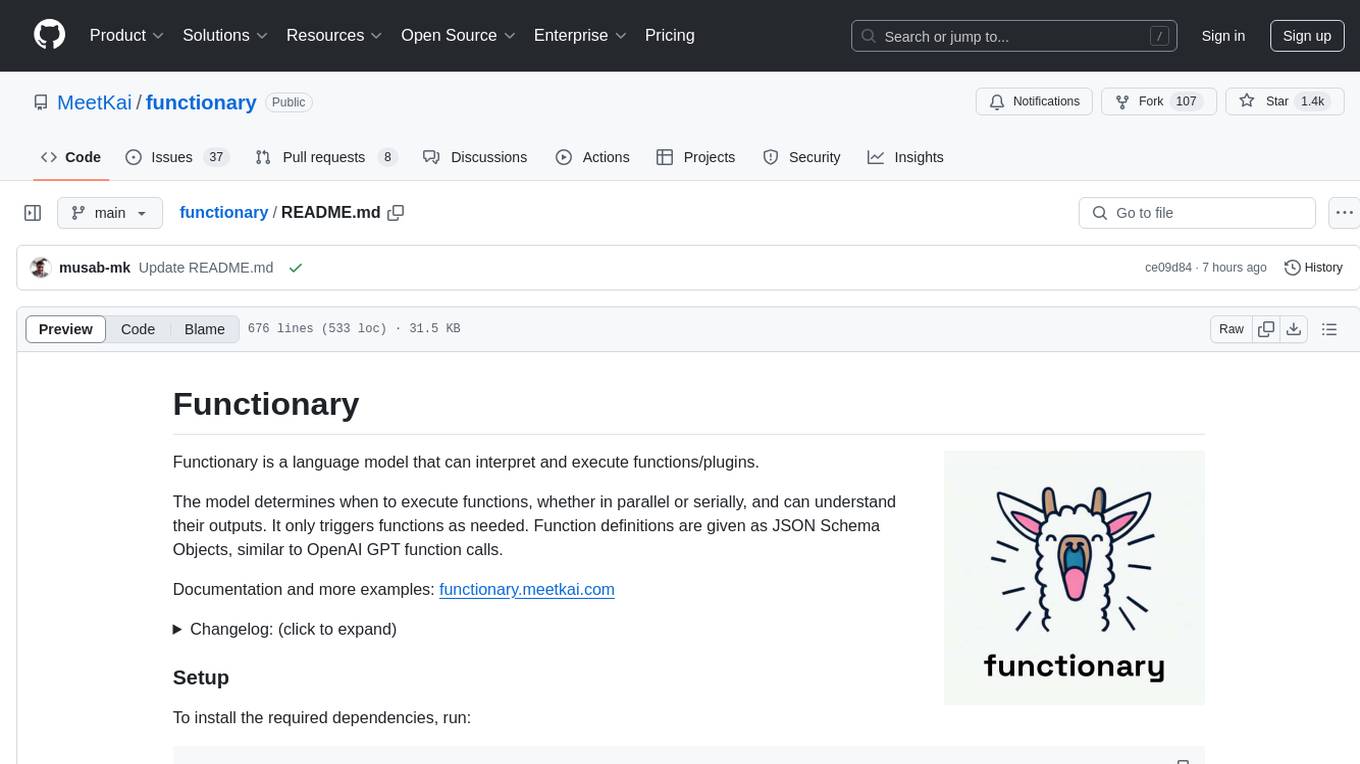
functionary
Functionary is a language model that interprets and executes functions/plugins. It determines when to execute functions, whether in parallel or serially, and understands their outputs. Function definitions are given as JSON Schema Objects, similar to OpenAI GPT function calls. It offers documentation and examples on functionary.meetkai.com. The newest model, meetkai/functionary-medium-v3.1, is ranked 2nd in the Berkeley Function-Calling Leaderboard. Functionary supports models with different context lengths and capabilities for function calling and code interpretation. It also provides grammar sampling for accurate function and parameter names. Users can deploy Functionary models serverlessly using Modal.com.
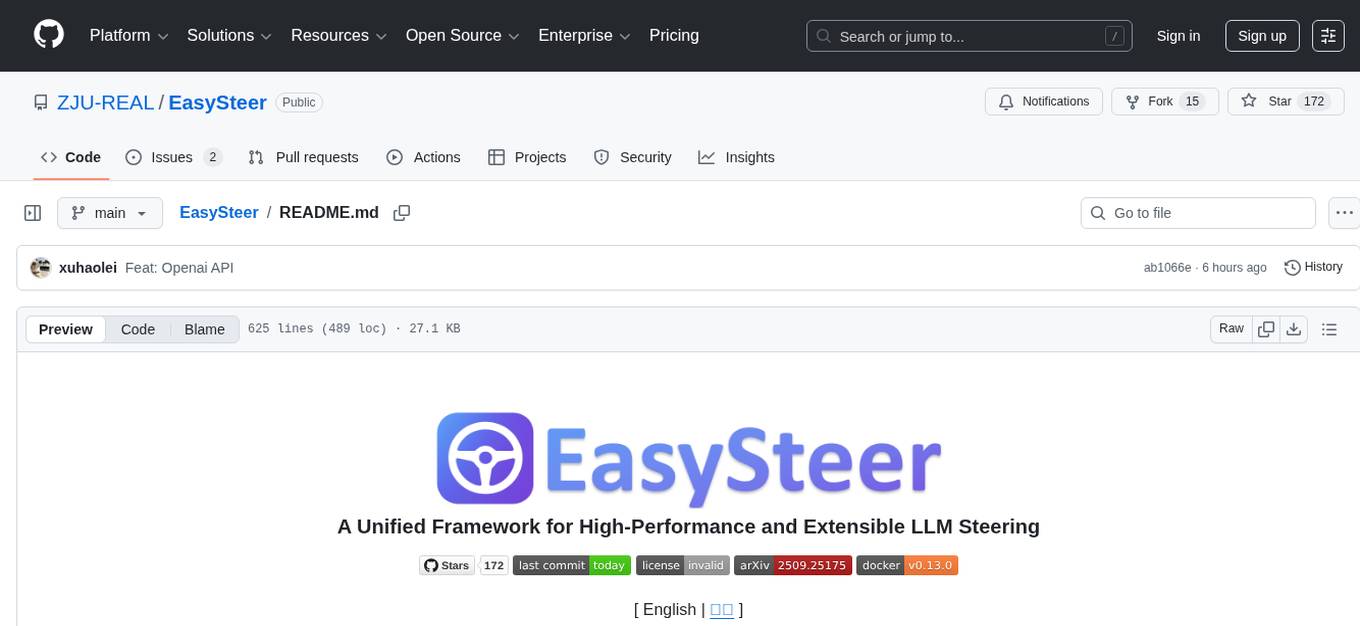
EasySteer
EasySteer is a unified framework built on vLLM for high-performance LLM steering. It offers fast, flexible, and easy-to-use steering capabilities with features like high performance, modular design, fine-grained control, pre-computed steering vectors, and an interactive demo. Users can interactively configure models, adjust steering parameters, and test interventions without writing code. The tool supports OpenAI-compatible APIs and provides modules for hidden states extraction, analysis-based steering, learning-based steering, and a frontend web interface for interactive steering and ReFT interventions.
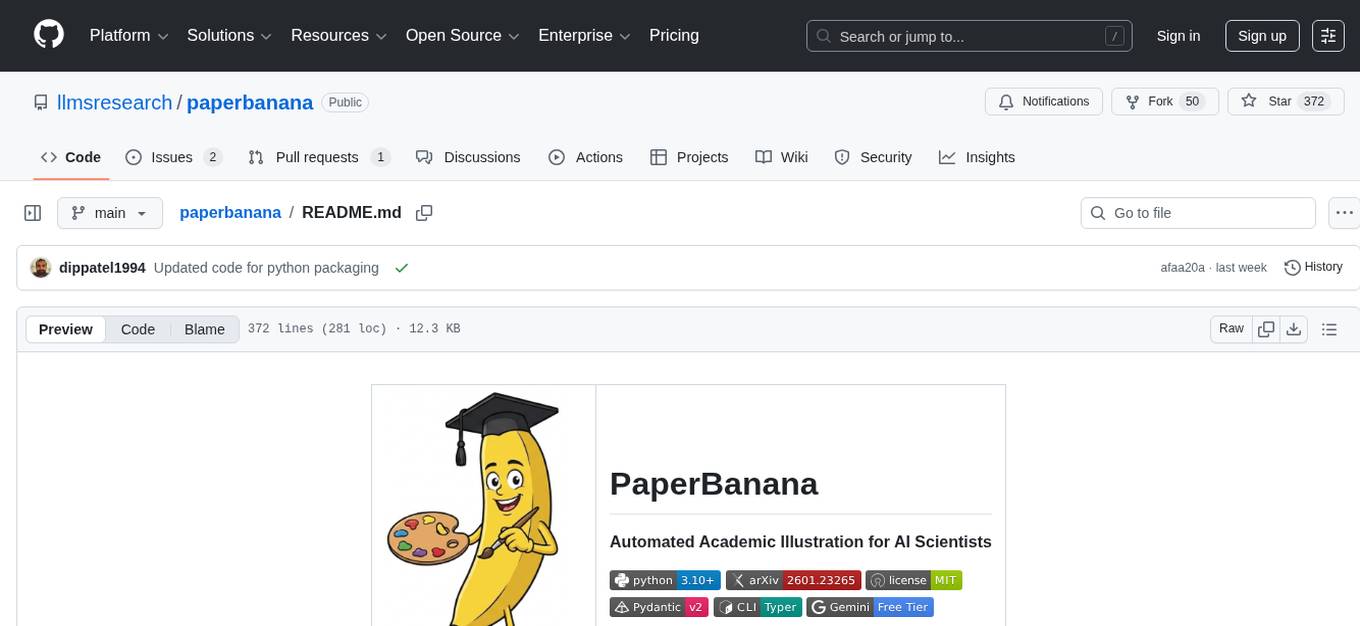
paperbanana
PaperBanana is an automated academic illustration tool designed for AI scientists. It implements an agentic framework for generating publication-quality academic diagrams and statistical plots from text descriptions. The tool utilizes a two-phase multi-agent pipeline with iterative refinement, Gemini-based VLM planning, and image generation. It offers a CLI, Python API, and MCP server for IDE integration, along with Claude Code skills for generating diagrams, plots, and evaluating diagrams. PaperBanana is not affiliated with or endorsed by the original authors or Google Research, and it may differ from the original system described in the paper.
For similar tasks

cyclops
Cyclops is a toolkit for facilitating research and deployment of ML models for healthcare. It provides a few high-level APIs namely: data - Create datasets for training, inference and evaluation. We use the popular 🤗 datasets to efficiently load and slice different modalities of data models - Use common model implementations using scikit-learn and PyTorch tasks - Use common ML task formulations such as binary classification or multi-label classification on tabular, time-series and image data evaluate - Evaluate models on clinical prediction tasks monitor - Detect dataset shift relevant for clinical use cases report - Create model report cards for clinical ML models
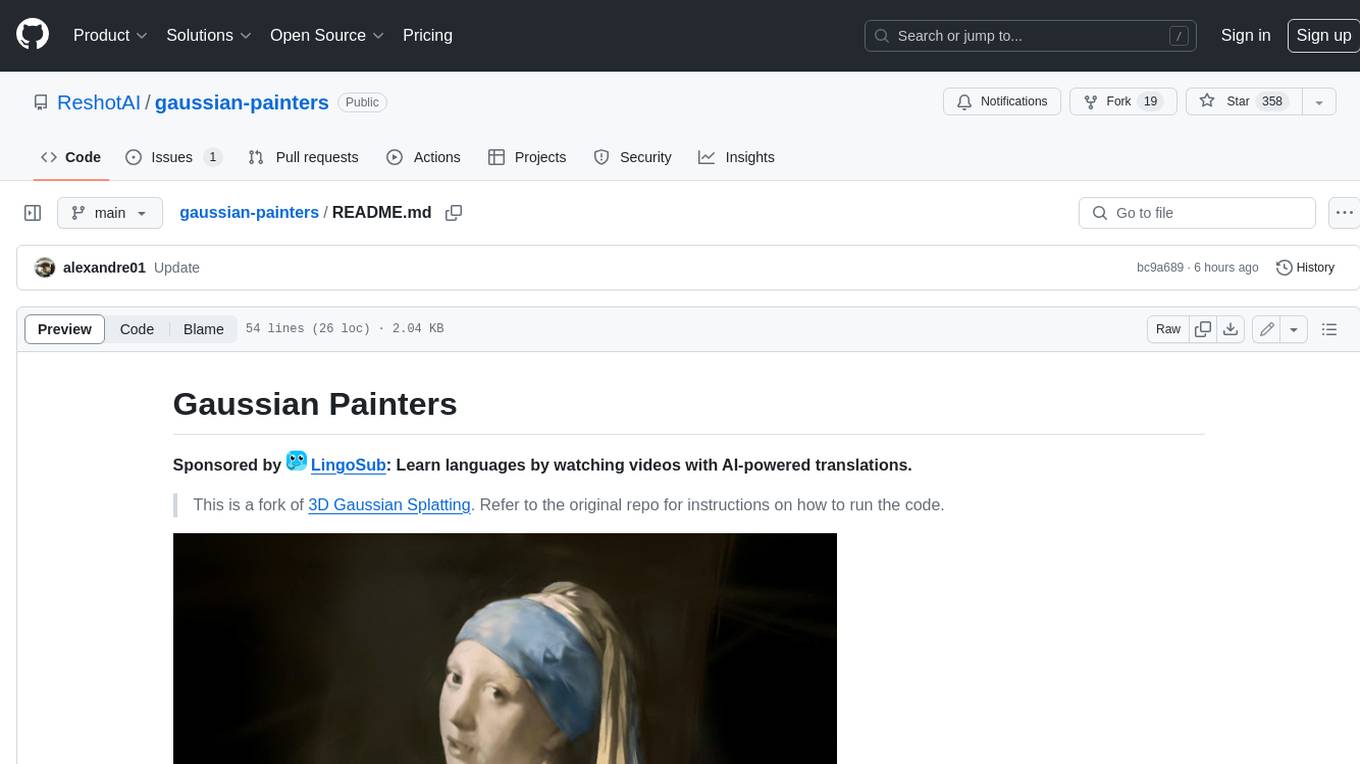
gaussian-painters
This tool is a fork of the 3D Gaussian Splatting code. It allows users to create a dataset ready to be trained with the Gaussian Splatting code. The dataset can be used for various experiments, such as creating orthogonal images, steganography, and lenticular effects. The tool also includes a visualizer that allows users to visualize the "painting" process during the Gaussian Splatting optimization.

UHGEval
UHGEval is a comprehensive framework designed for evaluating the hallucination phenomena. It includes UHGEval, a framework for evaluating hallucination, XinhuaHallucinations dataset, and UHGEval-dataset pipeline for creating XinhuaHallucinations. The framework offers flexibility and extensibility for evaluating common hallucination tasks, supporting various models and datasets. Researchers can use the open-source pipeline to create customized datasets. Supported tasks include QA, dialogue, summarization, and multi-choice tasks.
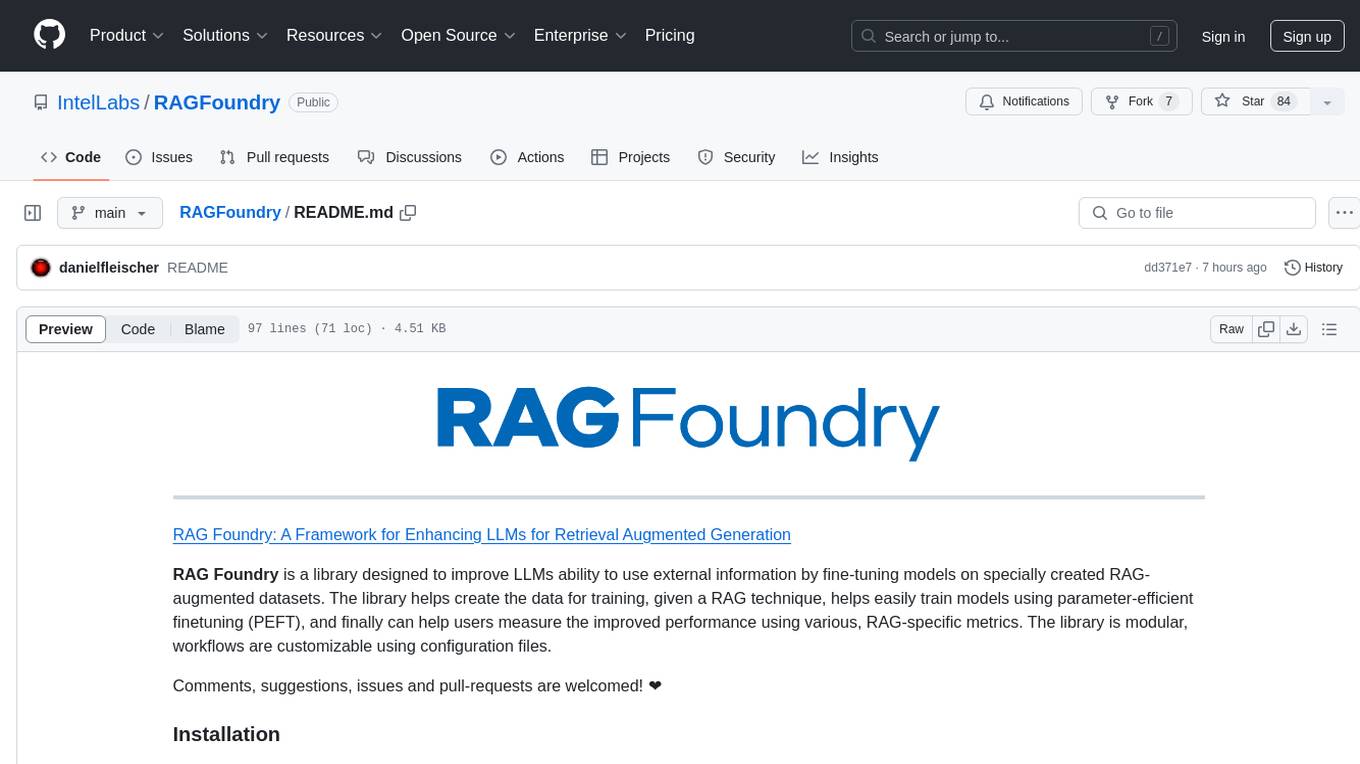
RAGFoundry
RAG Foundry is a library designed to enhance Large Language Models (LLMs) by fine-tuning models on RAG-augmented datasets. It helps create training data, train models using parameter-efficient finetuning (PEFT), and measure performance using RAG-specific metrics. The library is modular, customizable using configuration files, and facilitates prototyping with various RAG settings and configurations for tasks like data processing, retrieval, training, inference, and evaluation.
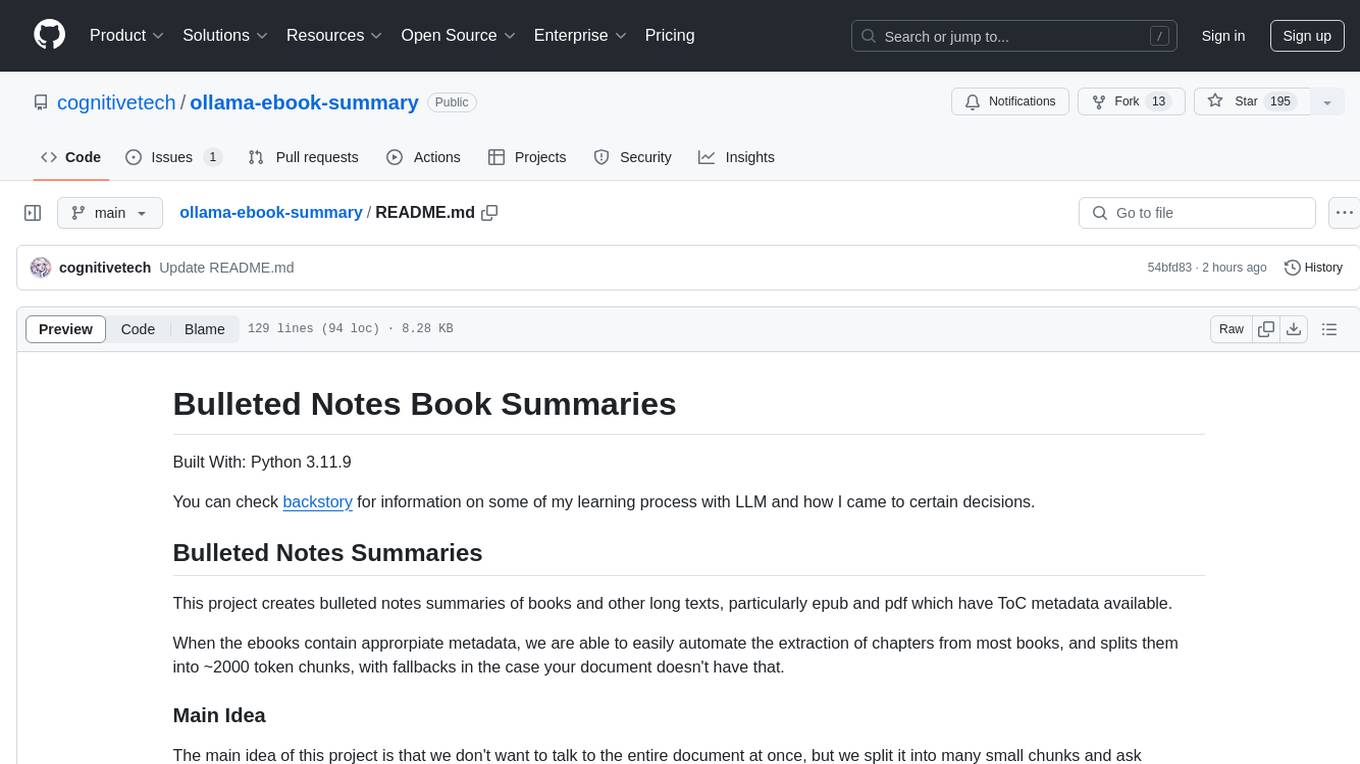
ollama-ebook-summary
The 'ollama-ebook-summary' repository is a Python project that creates bulleted notes summaries of books and long texts, particularly in epub and pdf formats with ToC metadata. It automates the extraction of chapters, splits them into ~2000 token chunks, and allows for asking arbitrary questions to parts of the text for improved granularity of response. The tool aims to provide summaries for each page of a book rather than a one-page summary of the entire document, enhancing content curation and knowledge sharing capabilities.
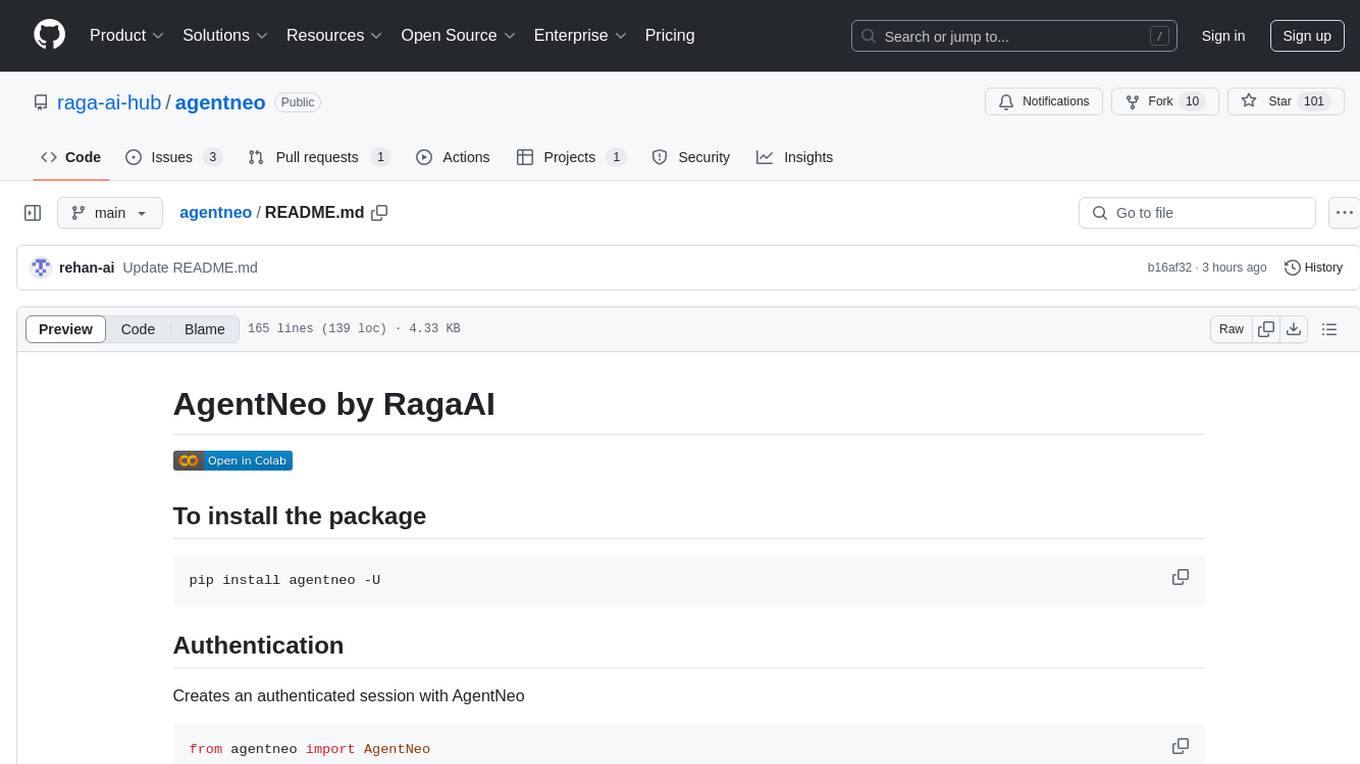
agentneo
AgentNeo is a Python package that provides functionalities for project, trace, dataset, experiment management. It allows users to authenticate, create projects, trace agents and LangGraph graphs, manage datasets, and run experiments with metrics. The tool aims to streamline AI project management and analysis by offering a comprehensive set of features.
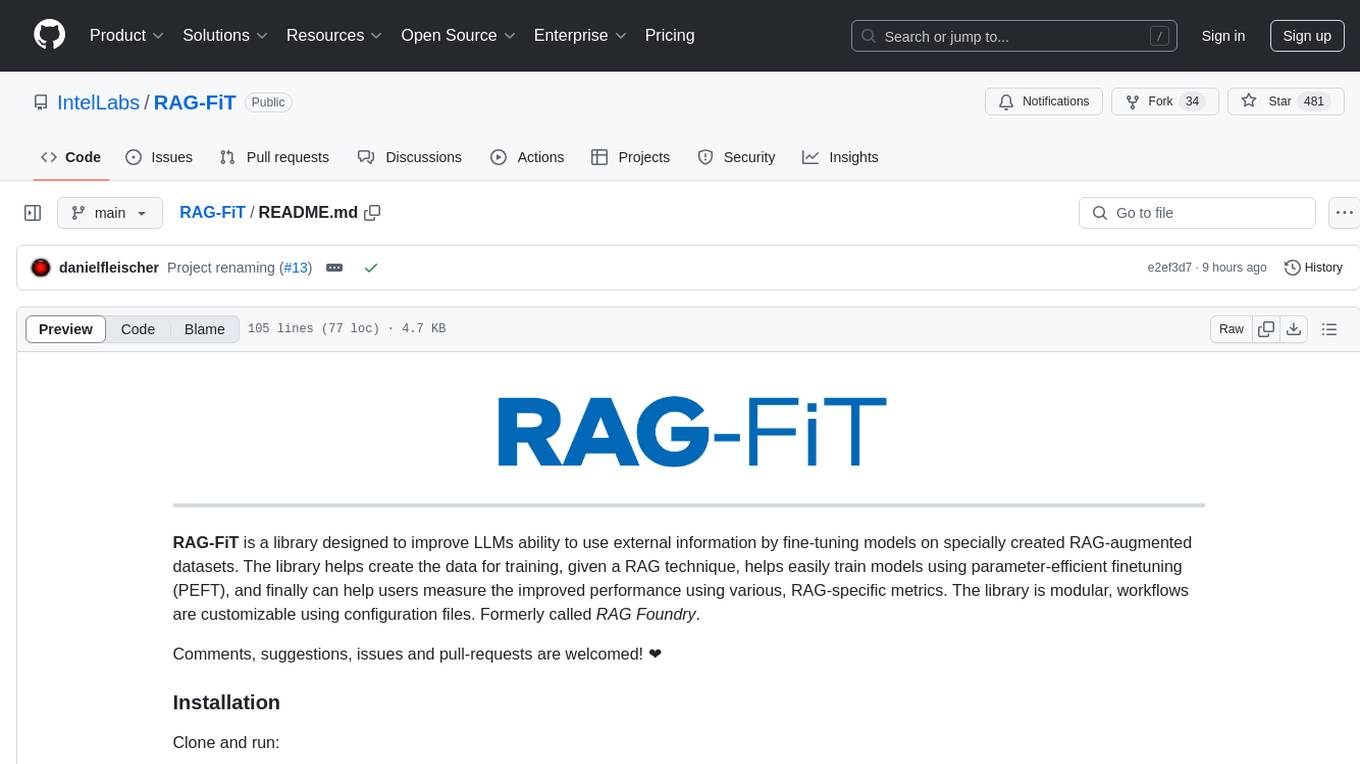
RAG-FiT
RAG-FiT is a library designed to improve Language Models' ability to use external information by fine-tuning models on specially created RAG-augmented datasets. The library assists in creating training data, training models using parameter-efficient finetuning (PEFT), and evaluating performance using RAG-specific metrics. It is modular, customizable via configuration files, and facilitates fast prototyping and experimentation with various RAG settings and configurations.
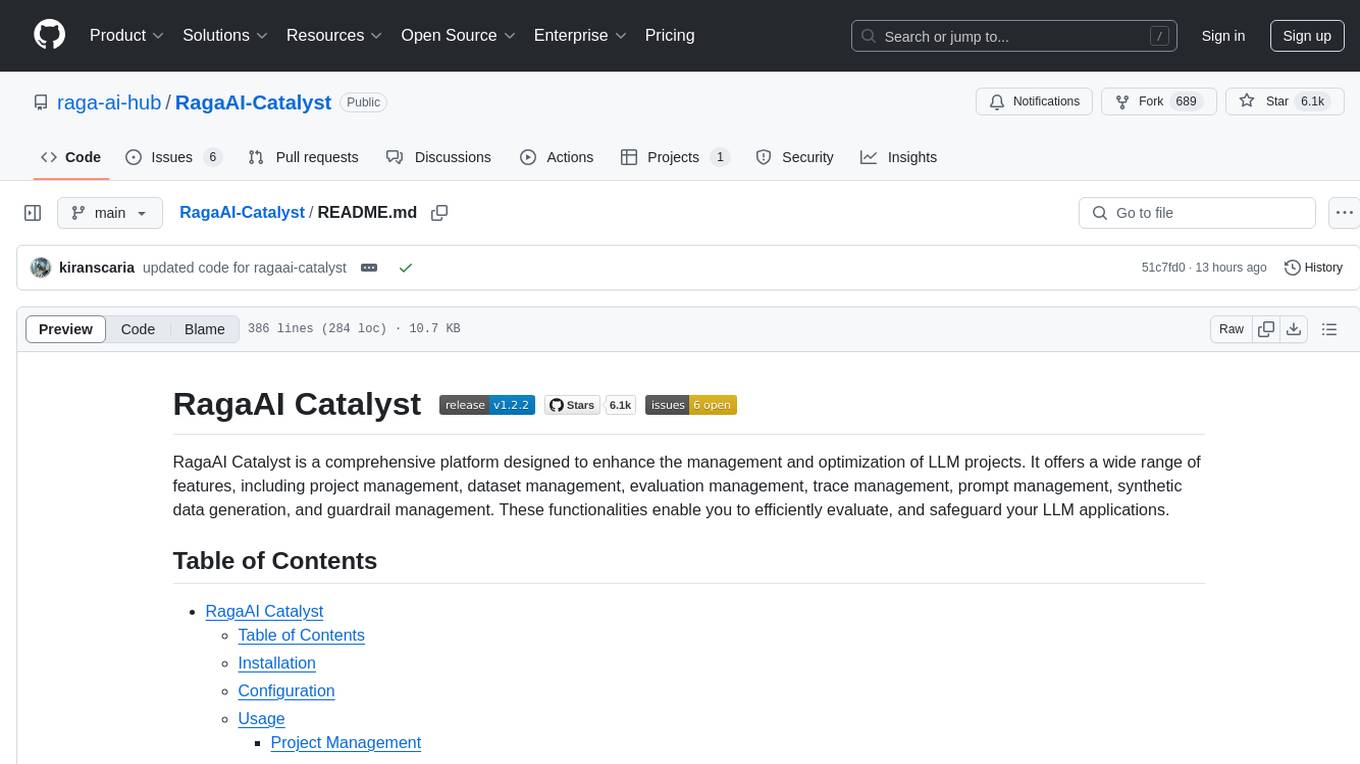
RagaAI-Catalyst
RagaAI Catalyst is a comprehensive platform designed to enhance the management and optimization of LLM projects. It offers features such as project management, dataset management, evaluation management, trace management, prompt management, synthetic data generation, and guardrail management. These functionalities enable efficient evaluation and safeguarding of LLM applications.
For similar jobs

weave
Weave is a toolkit for developing Generative AI applications, built by Weights & Biases. With Weave, you can log and debug language model inputs, outputs, and traces; build rigorous, apples-to-apples evaluations for language model use cases; and organize all the information generated across the LLM workflow, from experimentation to evaluations to production. Weave aims to bring rigor, best-practices, and composability to the inherently experimental process of developing Generative AI software, without introducing cognitive overhead.

LLMStack
LLMStack is a no-code platform for building generative AI agents, workflows, and chatbots. It allows users to connect their own data, internal tools, and GPT-powered models without any coding experience. LLMStack can be deployed to the cloud or on-premise and can be accessed via HTTP API or triggered from Slack or Discord.

VisionCraft
The VisionCraft API is a free API for using over 100 different AI models. From images to sound.

kaito
Kaito is an operator that automates the AI/ML inference model deployment in a Kubernetes cluster. It manages large model files using container images, avoids tuning deployment parameters to fit GPU hardware by providing preset configurations, auto-provisions GPU nodes based on model requirements, and hosts large model images in the public Microsoft Container Registry (MCR) if the license allows. Using Kaito, the workflow of onboarding large AI inference models in Kubernetes is largely simplified.

PyRIT
PyRIT is an open access automation framework designed to empower security professionals and ML engineers to red team foundation models and their applications. It automates AI Red Teaming tasks to allow operators to focus on more complicated and time-consuming tasks and can also identify security harms such as misuse (e.g., malware generation, jailbreaking), and privacy harms (e.g., identity theft). The goal is to allow researchers to have a baseline of how well their model and entire inference pipeline is doing against different harm categories and to be able to compare that baseline to future iterations of their model. This allows them to have empirical data on how well their model is doing today, and detect any degradation of performance based on future improvements.

tabby
Tabby is a self-hosted AI coding assistant, offering an open-source and on-premises alternative to GitHub Copilot. It boasts several key features: * Self-contained, with no need for a DBMS or cloud service. * OpenAPI interface, easy to integrate with existing infrastructure (e.g Cloud IDE). * Supports consumer-grade GPUs.

spear
SPEAR (Simulator for Photorealistic Embodied AI Research) is a powerful tool for training embodied agents. It features 300 unique virtual indoor environments with 2,566 unique rooms and 17,234 unique objects that can be manipulated individually. Each environment is designed by a professional artist and features detailed geometry, photorealistic materials, and a unique floor plan and object layout. SPEAR is implemented as Unreal Engine assets and provides an OpenAI Gym interface for interacting with the environments via Python.

Magick
Magick is a groundbreaking visual AIDE (Artificial Intelligence Development Environment) for no-code data pipelines and multimodal agents. Magick can connect to other services and comes with nodes and templates well-suited for intelligent agents, chatbots, complex reasoning systems and realistic characters.




